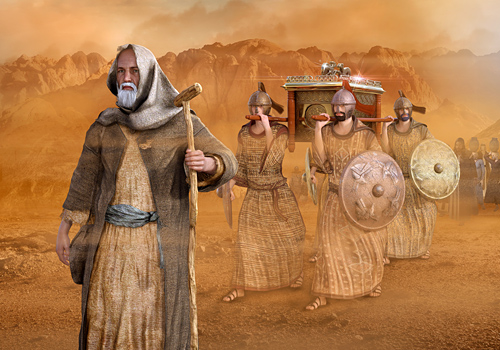Introduction to the Book of Deuteronomy
This page is an introduction and summary for the book of Deuteronomy in the Christian Bible. (Deuteronomy is also in the Jewish Bible, but I'll be covering it from a Christian perspective).
I'm doing several new pages on the first five books of the Bible (the books of Moses, also called the Pentateuch), and the "former prophets" which are the books of Joshua, Judges, 1&2 Samuel and 1&2 Kings.
I'll be working on these new pages in parallel as I study for my Old Testament exam on the 10th of June, and adding to them as I study. I figured I might as well be writing my study notes up online as web pages, since now that this website is set up, it's not that much harder than just doing them in a Word document (or something like that).
Introduction to Deuteronomy
Deuteronomy s is the fifth book of the Bible, and the last book of the Pentateuch (the books of Moses, i.e. the first 5 books of the Bible). (Pronounced doo-terr-ON-omm-me, or due-terr-ON-omm-me). It's name in the Hebrew Bible is "These are the words", meaning "These are the words of YHWH, the Lord". The English name is misleading, as it suggests a "second law" (deuteros means "2nd" in Greek). However it's not a second law at all, it's the same law as was given the first time in Leviticus, though it is being spoken again.
Deuteronomy is one of the most underrated books in the Bible, as I've been discovering in my theological studies. Jesus quotes from it more than any other book, and knew it so well that he must have spent a great deal of time reading and meditating on it over and over. He probably knew it off by heart.
Deuteronomy is described by many Bible scholars as being the climax of the Pentateuch, and the focal point of the entire Old Testament. It's also the basis for the rest of the Old Testament story, which is the story of the Israelites as they enter the land promised to them in the Pentateuch, and then continually fail to follow their own laws (which, in the Bible, are the laws given to Moses by God), and are then exiled from the promised land, and go into captivity.
Throughout the rest of the Old Testament, the basis of everything that happens, and the reasons for it, are given in Deuteronomy.
Before Reading or Studying Deuteronomy
Before reading or studying the Bible, it's a good idea to take a short break — to think about where the book of Deuteronomy came from, and how it's relevant to your own modern life right now. Christians believe that the Bible is the inspired Word of God. That is, the words in Deuteronomy were recorded by people in the distant past, as given to them by God.
Also, the Bible is a living document — it's the living word of God. This is a foreign concept to most of our modern culture today, so it takes some time to think about, and get used to the idea of it. Many people think of God as not speaking directly to us. Yet as Christians, God does speak to us directly, in words — and the way God does this is through his words in the Bible. This means that it's directly relevant to us, personally, as we read it. As you read the words of Deuteronomy (even if you don't really believe in this kind of stuff yet, you can still try doing this, as an experiment), imagine that God is speaking to you, personally, and directly.
Also, the Bible is an ancient document. It's very old — and the first few books of the Old Testament, especially so. A lot of things have changed since God's words were first recorded by humans. This means a lot of the Bible can be hard to understand in our modern world today. Which is why we're so lucky to have so much access to resources that can help us to understand it. As you read the words of Deuteronomy, also imagine that you're back then, in the days when it was written. This can help a lot with understanding the meaning (of some parts of the Bible more so than others). Learning about what the words meant in their original setting is a really good place to begin trying to understand what they mean now. Keep this idea in mind as you read the rest of this web page, and as you read the Bible.
Also, the Bible is a precious document. Its true value is hard to imagine. It's probably fair to say that nearly everyone today underestimates its value — at least in the free and well-off countries, where it's very easy (and cheap) for anyone to obtain a copy of the Bible, or read it on the internet. To help get a better appreciation for the value of the Bible, think about how God's word has travelled down through the centuries, and been preserved by copyists, translators, printers, and other people. At times parts of it were lost, and then found again. In recent years, thousands of ancient copies of scrolls have been found, which were meticulously copied by hand over and over, for thousands of years. In some places and at some times, to own a copy of the Bible (or even to believe in it) would bring the death penalty. This included many of those who wrote parts of it, or were written about in it (such as the Apostles of Jesus).

The second of two parchment sheets making up 4Q41 or 4QDeuteronomyn, also known as the "All Souls Deuteronomy", one of the Dead Sea Scrolls, dated to the first century BC. This second sheet contains Deuteronomy 5:1-6:1, and thus preserves one of the oldest extant copies of the Ten Commandments. Date c. 30-1 BC. Source: Wikimedia Commons.
Interesting Facts About Deuteronomy
- Deuteronomy mentions it's own importance, as something to be read every day, over and over. At least by some types of people (not everyone could read in those days).
- Its principles go very far, and can be applied to all of life, "When you sit in your house, and when you walk by the way, and when you lie down, and when you rise" (Deuteronomy 6:7).
- Like Leviticus, the book and laws of Deuteronomy are much more about grace than they are about "works". That is, God saves his people, first, because of his love for them and his desire to have companionship and relationship with them.
- The laws are then given to the people as a way that they can maintain this relationship, without breaking it by doing things that are incompatible with God's ways. Since God is a Holy God, that means a certain level of holiness is required for someone to be able to have an ongoing, close, special relationship with God as one of God's people.
Read Deuteronomy
Click here to read the book of Deuteronomy.
Click here to see Deuteronomy in its original language of Ancient Hebrew. Or here to read Deuteronomy in Hebrew and English side-by-side.








